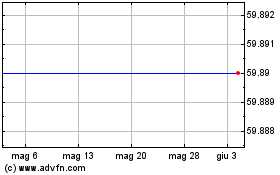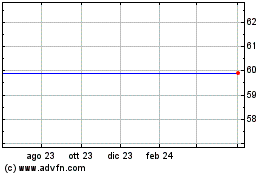By Rolfe Winkler and Heather Haddon
This article is being republished as part of our daily
reproduction of WSJ.com articles that also appeared in the U.S.
print edition of The Wall Street Journal (November 21, 2019).
Grubhub Inc. Chief Executive Matt Maloney says his food-delivery
rivals need to charge more sales taxes on their delivery fees. They
disagree.
Delivery fees administered by companies like Uber Technologies
Inc.'s Uber Eats division, Postmates Inc., DoorDash Inc. and
Grubhub are receiving increasing attention from local officials who
have watched the industry grow quickly in the past several years.
Food-delivery companies were projected to charge $10.4 billion in
delivery fees in the U.S. by 2023, compared with $4.4 billion in
2017, according to analysts at Cowen & Co.
If such fees get taxed more uniformly, customers could shell out
tens of millions of dollars more for the newly popular delivery
services. Already customers can find themselves paying different
amounts for the same order, depending on which service they use,
and those delivery costs could rise further as the companies shift
away from incentives and aim to improve profitability.
Meanwhile, some of the services could face tax liability for
incorrect collections in the past.
Complicating the sales-tax debate is that laws vary by state,
and it isn't clear if the delivery companies' business models,
which differ in some ways, would be treated the same for sales-tax
purposes.
"Taxation of food delivery is a hot mess," said Stephen Kranz, a
tax lawyer with McDermott Will & Emery. "In general though,
delivery fees are more often than not taxable," he said.
An Uber spokeswoman said the company collects sales tax on
delivery fees where required. A Postmates spokeswoman said the
company is complying with all regulations and tax laws, and a
DoorDash spokeswoman declined to comment.
Grubhub's Mr. Maloney said he is confident that his company is
collecting the appropriate sales taxes.
"The 34 states that have told us to tax our service and delivery
fees need to audit everyone in our industry to make sure we're
following their tax laws," he said in an interview. "I'm happy to
be audited with the rest of them."
Mr. Maloney estimated that, so far this year in four of its top
states, Grubhub has collected $10 million in sales taxes on fees
for food orders delivered by his company's staff. The four states
are New York, California, Texas and Pennsylvania.
For orders on Grubhub that restaurant partners deliver
themselves, Mr. Maloney estimated his company has collected another
$36 million in sales taxes on fees. In this case, it sends the
money back to restaurants that remit it to states themselves.
A Wall Street Journal analysis of dozens of test food orders
across the four states and Washington, D.C., showed that Grubhub's
three major rivals typically collect sales tax on the food
subtotal, whereas Grubhub charges tax on food plus fees. In some
cases, the same restaurants sold the same food at the same price on
all four websites, but the totals varied widely based on the added
fees. Only Grubhub collected sales tax on delivery and service fees
in all of the instances.
Sirloin steak fajitas and chicken nachos from an Applebee's in
Philadelphia were available for the same price before fees from the
four major delivery services: $28.98, according to a Journal test.
Grubhub charged sales taxes against the total bill, including fees.
DoorDash charged sales taxes against the food only. Postmates
charged some taxes, but below the statutory amount of 8%. Uber Eats
charged no taxes.
A spokesman for the Pennsylvania Department of Revenue said "the
food-delivery companies should be collecting sales tax on the
entire purchase price, which includes the cost of food, delivery
and service fees." An Uber spokeswoman said the lack of taxes for
the Pennsylvania order was the result of a glitch and it was being
fixed.
The services' different business models also can affect how
taxes are applied. In an increasing number of cases, delivery
companies strike deals with restaurants to integrate transactions
more directly into their point of sale. Other times the services,
particularly DoorDash and Postmates, purchase food on behalf of
their customers instead of passing the order directly to the
restaurant, in effect becoming a food retailer themselves.
When restaurants bundle delivery with their food, the delivery
fee is typically taxable. Domino's Pizza Inc. collected tax against
the total value of its orders, including delivery fees, in the four
states and Washington, D.C., according to the Journal's tests.
Adding to the ambiguity, some restaurant chains are signing
deals with multiple delivery services, yet the services collect
taxes differently on the same orders. Subway advertises its
relationships with DoorDash, Uber Eats and Grubhub. In a Journal
test for a Subway order placed in San Francisco, Uber Eats and
DoorDash collected taxes against the food charge only, while
Grubhub collected sales taxes against the food and fees.
A spokesman for the California Department of Tax and Fee
Administration said the taxability of delivery fees can depend on
contract terms between restaurants and delivery companies.
Karey Barton, the associate deputy comptroller for tax in Texas,
said his state taxes delivery fees differently depending on, among
other things, whether delivery services have signed contracts with
restaurants and the terms. He said he wasn't sure why companies
that work directly with the same restaurants might collect taxes
differently.
A spokesman for the New York State Department of Taxation and
Finance said that agency determined in 2014 that the fees weren't
taxable according to the facts at that time, and declined to
comment further.
New York City Councilman Mark Gjonaj, chair of a council
committee that has been probing fees charged by food-delivery
companies, said the issue of tax administration deserves to be
examined.
"This and other issues related to compliance, transparency and
consumer protections are certainly part of the committee's current
inquiry into the sector," Mr. Gjonaj said.
Meanwhile, investors have grown more skeptical of the
food-delivery business model. Uber's declining stock price
spotlights its money losing operations, including incentives used
to expand Uber Eats. Postmates delayed its initial public offering,
with executives citing "choppiness" in the public markets.
DoorDash, an industry darling after racing to huge market share
gains in 2019, has likely seen its valuation shrink from $13
billion, where it raised money privately in May. That is because
DoorDash's U.S. sales aren't much more than Grubhub's, credit-card
data from research firm Second Measure suggests. Grubhub's market
capitalization is below $4 billion.
Grubhub's shares have tumbled more than 30% since the company
gave a gloomy forecast for future profit and sales last month. At
the time, Mr. Maloney released a detailed letter to shareholders
explaining, in part, how the company plans to spend more to fend
off heavy competition, significantly reducing profit.
Write to Rolfe Winkler at rolfe.winkler@wsj.com and Heather
Haddon at heather.haddon@wsj.com
(END) Dow Jones Newswires
November 21, 2019 02:47 ET (07:47 GMT)
Copyright (c) 2019 Dow Jones & Company, Inc.
Grafico Azioni GrubHub (NYSE:GRUB)
Storico
Da Giu 2024 a Lug 2024

Grafico Azioni GrubHub (NYSE:GRUB)
Storico
Da Lug 2023 a Lug 2024
